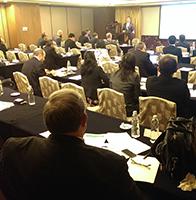The growing interest for ethanol in the Asia-Pacific region is driven in part by ever-growing environmental concerns, especially those related to rising greenhouse gas (GHG) emissions and deteriorating air quality, the direct results of rapidly-rising fossil fuel consumption across the region.
Responding to these issues, a team of ethanol industry representatives from the U.S. Grains Council (USGC), the Renewable Fuels Association (RFA) and Growth Energy traveled to Taiwan this week to participate with delegates from energy ministries of 14 countries from across the region in an ethanol trade development conference sponsored by the Asia Pacific Economic Cooperation (APEC).
The two-day event centered on discussions of policy support to foster trade, production and consumption of ethanol and the ways in which ethanol improves air quality, mitigates GHG emissions, improves engine performance and can improve the economics of petroleum refining.
“International trade in ethanol could provide opportunities for APEC economies to foster sustainable energy development across their region,� said USGC Chief Economist Mike Dwyer, who spoke at the event.
“APEC economies are largely net energy importers with a rising energy demand that accounts for about 60 percent of the world’s energy consumption. If these countries pursue including a greater percentage of fuel-grade ethanol into their energy portfolio, we would see them take a vital step towards achieving APEC’s goal of doubling the share of renewables in the region’s energy usage by 2030.�
Representatives from several countries provided case studies as part of this capacity building and policy advocacy program, organized by the USDA’s Foreign Agricultural Service (FAS) under an APEC grant. These studies documented experiences in the Philippines, Taiwan, Indonesia, Thailand, Australia, Peru, Russia, China and Vietnam, focusing on their successes, challenges and potential for increased ethanol utilization in the years ahead.
“These case studies helped emphasize the point that while the United States exported more than 870 million gallons (3.2 billion liters) of ethanol during the 2014/2015 marketing year, there is room for much more,â€� Dwyer said. “Asia – particularly China, Japan, Korea, Taiwan and the Philippines – offers exciting opportunities for U.S. ethanol exports. However, demand doesn’t happen on its own, we have to help build it from the ground up.â€�
The Council and its ethanol industry partners are to establish contacts and initiate efforts to increase individual country commitments to biofuels and to address regulatory barriers to U.S. ethanol exports. Ethanol export market development efforts also include work to build public confidence in ethanol across the region as a desirable renewable fuel source with diverse benefits.
Following the APEC workshop, a team of representatives from RFA, Growth Energy and the Council is traveling to China and India to discuss policy and trade issues that affect their use of ethanol. During these visits, the team will work to create alliances with local ethanol industries and their governments to potentially increase ethanol usage within each market.
Click here to read past Global Update articles on ethanol.



